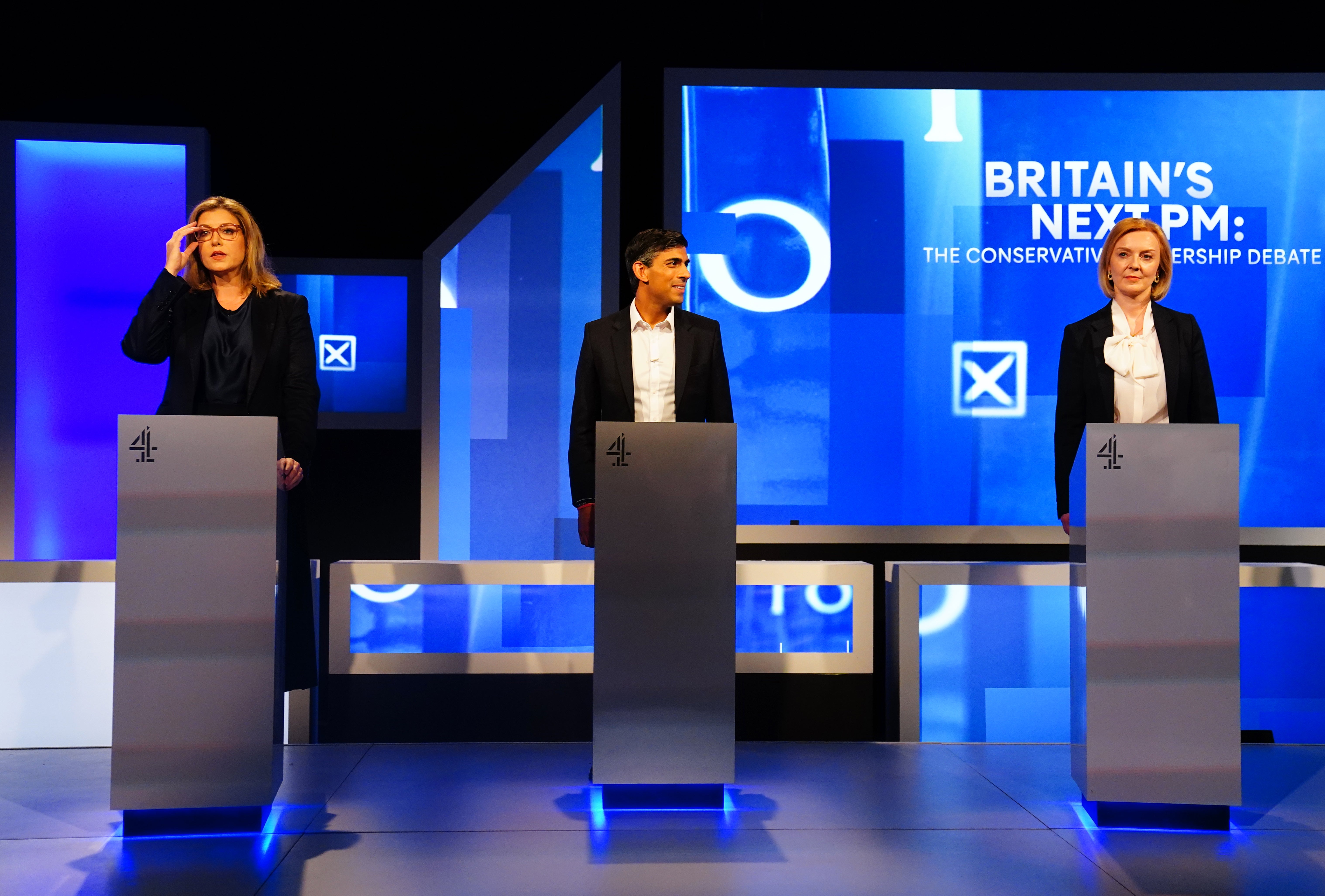Key points from the Tory leadership debate: Trans rights, net-zero and Boris Johnson’s honesty
Tory leadership rivals clashed over taxes and gender identity
Your support helps us to tell the story
From reproductive rights to climate change to Big Tech, The Independent is on the ground when the story is developing. Whether it's investigating the financials of Elon Musk's pro-Trump PAC or producing our latest documentary, 'The A Word', which shines a light on the American women fighting for reproductive rights, we know how important it is to parse out the facts from the messaging.
At such a critical moment in US history, we need reporters on the ground. Your donation allows us to keep sending journalists to speak to both sides of the story.
The Independent is trusted by Americans across the entire political spectrum. And unlike many other quality news outlets, we choose not to lock Americans out of our reporting and analysis with paywalls. We believe quality journalism should be available to everyone, paid for by those who can afford it.
Your support makes all the difference.Trans rights, the net-zero carbon target, and whether Boris Johnson is honest were key talking points during the first Tory leadership debate.
Penny Mordaunt and Kemi Badenoch clashed over Ms Mordaunt’s stance on gender identity, while former chancellor Rishi Sunak took aim at the other candidates over their “fairytale” tax cut plans.
Here are the key points raised during the hour-and-a-half long debate aired on Channel 4:
Only Tom Tugendhat directly said he did not think Boris Johnson was trustworthy.
The candidates were asked to reply yes or no over whether they believed the outgoing prime minister was honest.
Ms Badenoch said Mr Johnson was “sometimes” honest, while Ms Mordaunt said he has “paid a price” for “some really severe issues” with his premiership.
The recent chancellor, Mr Sunak, said: “I tried to give him the benefit of the doubt for as long as possible and ultimately I reached the conclusion that I couldn’t, and that’s why I resigned… There were a number of reasons that I resigned but trust and honesty was part of that.”

Ms Truss said Mr Johnson “has been very clear that he made mistakes in Government” but she had taken his explanation for inaccurate statements over partygate “at face value”.
On the question of whether Mr Johnson was honest, Mr Tugendhat simply said: “No.”
Penny Mordaunt clashed with Kemi Badenoch over past stances on gender identity rights.
Ms Mordaunt, a former women and equalities minister, said while she had carried out a consultation of the Gender Recognition Act, she had “never been in favour of self-ID”.
“I can’t imagine why people are not comprehending what I say and have been regurgitating this issue for weeks and weeks, but I’m happy to state my position and evidence to back it up,” she said.
When asked whether she accepted this, Ms Badenoch, who was equalities minister until she resigned this month, said: “I find it difficult to, because when I took over as equalities minister in 2020, the policy that was being pushed was self-ID.
“I didn’t work with Penny, but my understanding was that the previous minister who had done the role had wanted self-ID, and that was something that I reversed with Liz.”
Ms Truss refused to clarify whether she thought Ms Mordaunt’s stance on gender-ID has changed.
Rishi Sunak levelled attacks against Penny Mordaunt, as well as against Liz Truss, over their plans to introduce tax cuts.
Mr Sunak told Ms Truss that “borrowing your way out of inflation” is a “fairytale”.
Ms Truss responded: “I think it is wrong to put taxes up.”
She added: “We have inflation because of our monetary policy, that we haven’t been tough enough on the monetary supply, that’s the way that I would address that issue.”
Mr Sunak also attacked Ms Mordaunt’s “double-digit billion pound promises”.
The international trade minister has promised to cut VAT on fuel and increase income tax thresholds in line with inflation – something Mr Sunak said would cost around £15 billion.
Ms Mordaunt said: “My economic platform is not based on tax and spend, it’s based on growth and competition.”
Kemi Badenoch was the only candidate saying she would not commit to the current net-zero pledge.
The government is currently working towards a target to cut carbon emissions to zero by 2050.
While the other four candidates said they would still work towards this deadline as prime minister, Ms Badenoch said she would not.
She dismissed international environment minister Lord Goldsmith’s warning that it would be “political suicide” to drop the 2050 net zero target.
She said: “I think he’s wrong.
“The pledge was made in 2018 for 2050, none of us are going to be here as politicians in 2050, it’s very easy to set a target you are not going to be responsible and accountable for when the time comes.
“The important thing is to make sure that we do this in a sustainable way.
“Many of the things we are doing could economically damage our country.”